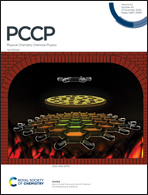The non-adiabatic exciton transfer in tetrathiafulvalene chains: a theoretical study of signal transmission in a molecular logic system†
Abstract
Using an exciton as a carrier was examined as a possible solution to the problem of signal transmission between molecular logic gates. A tetrathiafulvalene chain was chosen as a model for a molecular logic system and its distinct logic states were described as excitons located at certain tetrathiafulvalene units. The parameters of the exciton transfer between the units of the chain were studied. The transfer rate between the two adjacent units was calculated using the Plotnikov–Bixon–Jortner theory basing on molecular parameters calculated using TD-DFT. The order of electronic states was studied at the MCQDPT and TD-DFT levels of theory. It was found that certain functional groups in the chain can make exciton transfer faster than its recombination. The exciton can effectively carry a signal through the chain, which in turn can be enlarged and modified.



 Please wait while we load your content...
Please wait while we load your content...